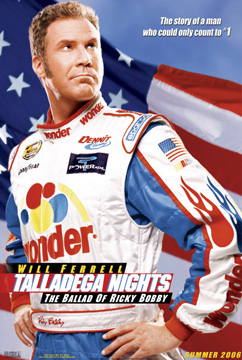 The first time I interviewed John C Reilly, for Criminal, I asked him about his first movie role in Casualties of War. He got kind of annoyed, saying it was old news, but I thought it was a pretty fascinating story (he went with the production to Thailand as an extra and ended up being like fourth lead). I didn’t hold it against him, though – how could I? Reilly’s one of our great character actors, a dying breed. And he’s one of the great character actors who seems to have no limit to his range.
The first time I interviewed John C Reilly, for Criminal, I asked him about his first movie role in Casualties of War. He got kind of annoyed, saying it was old news, but I thought it was a pretty fascinating story (he went with the production to Thailand as an extra and ended up being like fourth lead). I didn’t hold it against him, though – how could I? Reilly’s one of our great character actors, a dying breed. And he’s one of the great character actors who seems to have no limit to his range.
Comedy seems to come easy to him, judging by his very funny work. In Talladega Nights he plays very much an analogue to his character in that other Nights film, Boogie Nights – the clueless and hero-worshipping best friend. His chemistry with Will Ferrell is perfect, and his moustache is almost as perfect.
In real life Reilly’s a tall guy (what happened to all the short actors we always heard about), and he’s a little subdued. The junket for Talladega Nights was being held in Chicago, which must have been nice for him, since that’s where he’s from. He took up acting in the Windy City as a student at DePaul and studied on the stage there.
Q: How did you feel with all the responsibility to carry the humor?
Reilly: That’s great for an actor, you feel like really independent and it’s kind of liberating to be able to bring your own ideas to things, but it’s also a lot of pressure, it’s like screenwriting on your feet. But yeah, that was one of the most attractive things about this project to me, when Will [Ferrell] and Adam [McKay] called me, because they had asked me to do Anchorman, but I was working on another movie and I couldn’t do it. I was crushed by that, because I knew that that movie was gonna be amazing, and sure enough, it’s like this classic now. When they called, I said well that’s great, I’ve played the best friend a lot, a lot, and of course I want to work with you guys and I would love to, but this has to be the ultimate best friend. If I’m gonna be the best friend again, it has to be the ultimate best friend. And they’re like, yeah, whatever you want, if you have any ideas, and from that very first phone call when they called me, they like started soliciting my ideas. The way that Adam and Will work together, improv is like an integral part of the whole thing, and when they wrote the script, they tried to get it as good as they can, as funny as it can be, and as tight and structured as it can be, but they also build in to the design that they’re gonna throw the scene out when they get there, if they feel like it. So it was great, it was really a real collaboration. These guys really showed me what a real collaboration could be. Because I’ve worked with a lot of great directors and often times they solicit your ideas, but I felt like a partner on this one.
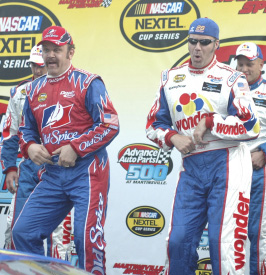 Q: Did you feel your different backgrounds while filming, theirs being improv and yours drama?
Q: Did you feel your different backgrounds while filming, theirs being improv and yours drama?
Reilly: Well, Adam and Will both come from an improv theatre background, and that’s · I mean, that’s I think my strongest suit. When I went to acting school, the thing that I did well in all the different areas of stuff we were studying, but what I found the most fun were my improv classes. And the stuff that I’ve studied and techniques and whatever, theatre games that I played in improv class, are the same as what Will and Adam were doing in Second City and the Groundlings, essentially. A lot of the rules that you operate by are the same, so I didn’t feel like a fish out of water like, ‘Wow, this is really different than the way I work.’ It felt like ‘Yeah, this is what those fun days in acting class felt like, like getting to riff on.’ And it’s just a joyous thing.
I like doing serious movies too. I don’t think I could ever stop doing serious movies and just do comedies, or vice versa, but there is something cool about going to work everyday and you’re just trying to make your friends laugh. That’s nice work if you can get it, you know what I mean? It’s different than going to work and knowing that I’ve gotta slap someone in the face today, and then I’ve gotta cry, and someone’s gonna die, I’ve gotta get myself to that place. Somehow that doesn’t feel like a natural human thing to do, to go to those dark places, you have to kind of force yourself to do that. And comedy, it’s like you’re excited to get there in the morning every day.
Q: What’s the difference between improv in this film and the looseness of an (Robert) Altman film?
Reilly: Well, I’ve only done one Altman film, and it was Prairie Home Companion, and that movie actually, despite its seeming… I don’t know if you saw it, but it seems like a lot of it is improvised, but that was actually mostly scripted in that movie. I think the feeling you get of improvisation in that movie is more like in the ease at which people are moving around in scenes and overlapping each other, but there wasn’t a lot of improv out of whole cloth, you know, like we’re gonna just riff on the scene here. It’s more like a little bit here at the end of the scene, or Meryl [Streep] and Lily [Tomlin] I think did a lot of improvising, but I didn’t do that much. But I do a lot of improvising on movies, actually. In Paul Thomas Anderson’s movies, there’s huge sections that are improvised. In Boogie Nights, all of the recording studio stuff, all improvised. Paul would guide it, and he would say, ‘Here’s the idea, you need to get the tapes back from the guy at the studio, he’s not gonna give them to you, go.’
But these guys, they give as much weight and respect and time and energy to improv as they do to the scripted stuff. Whereas in most movies, from my viewpoint, including the Altman movie, we’re trying to do the script, and if we have time, to goof around a bit at the end, or if one line is a little clunky and you want to change one line, that’s fine, but what we’re trying to really do is the script. These guys, I think, almost view the script as a road map for the improv. Like we’d do the scripted version one time, two times, and some scenes are just done as they’re written, but for the most part it’s like, okay, when can we get to the goofing around part!
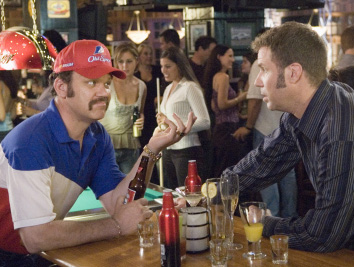 Q: What’s your favorite improvised moment that made it into the film?
Q: What’s your favorite improvised moment that made it into the film?
Reilly: Of mine?
Q: Of anyone.
Reilly: Well it’s gonna sound… it’s a little subtle, but there’s this one little interchange, which is in I think my favorite scene of the movie, in the hospital scene, where Will’s in the wheelchair [laughs], he says, ‘Yeah I got myself a hundred thousand dollar handicapped van,’ and I go, ‘Are you all paid up on that?’ He’s like ‘Oh yeah, yeah, fully paid.’ We only did that once, and it was in that moment of just this weird little thing, like I’m checking to see – because I love him so much – like maybe we could return the van, because you don’t need it. Anyway, there’s a lot of stuff… I was just saying about those kids, those kids have some amazing ones, like ‘I’m all jacked up on Mountain Dew! I’m gonna come at you like a Spider Monkey!’ We were just throwing lines to them, me included, like everyone. The kids are doing coverage, and I was like, ‘Say I’m all jacked up on Mountain Dew!’ I don’t know if all those bloopers are in there, but Adam had some amazing stuff he was saying to those kids, like ‘Tom Brokaw my ass! No, no, best generation of…’ what did they call the World War II generation?
Q: Greatest generation.
Reilly: ‘Greatest generation my ass, Tom Brokaw’s a punk!’ Do they say that, in the movie? That was one of the improvs, it was in the movie for a while. I’ve seen like five versions as they edited down the longer version into what it is now.
Q: Were you a fan of the sport before this film?
Reilly: Well, I did Days of Thunder, so I was definitely exposed to the sport before. I can’t say I’m… I’m not a huge sports fan in general, I don’t spend a lot of time watching other people do stuff. I tend to like to go out and do stuff myself. But yeah, so I was aware of it. It was amazing, kind of, going back to Charlotte fifteen years later and seeing how that city has changed, and how the sport – like I didn’t even realize that there was a track up here, but the Chicagoland Speedway, that’s a huge place, and all my family started calling me for tickets, ‘I want to go to the race.’ It’s like, when did this become popular in Chicago? I don’t know if any of you are from Chicago, but the only thing that you ever had here of race car driving was this thing that would happen called the Sunday U.S. Dirty Drag Strip: ‘Sunday, Sunday, Sunday!’ This crazy commercial on the radio, and it was all about just drag racing, but now like stock car racing is huge here. But yeah, I got a lot more into it on this movie, actually, despite the fact that Days of Thunder was the more serious NASCAR movie. We had so much money on that movie that they would recreate everything, they would recreate the entire race with thousands of extras and so I never really got that close to the real world of racing. On this one we shot at the real races, so we got to interact with the drivers, and the fans, and so it was a more exciting and more real glimpse at the race world.
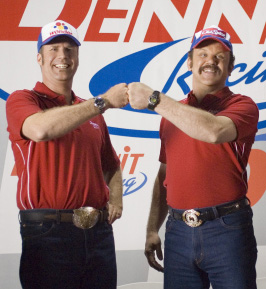 Q: What is the most surreal or absurd aspect of NASCAR? There’s a whole trailer city that builds up around these tracks.
Q: What is the most surreal or absurd aspect of NASCAR? There’s a whole trailer city that builds up around these tracks.
Reilly: Yeah, it’s almost like it should be anything but once a big group of people decide, like we’re gonna convene here, and have a good time. It’s funny, because the truth is, when you’re at the track, it was an interesting thing about stock car racing as a sport, is you almost get more out of it watching it on TV. Like when I was at the track I spent a long time in the pits and looking, and I went up in the stands, trying to [figure out] what’s the best spot to watch this race? I’d go up on the high turns and these different places, and that made me feel like, wow, you only glimpse them for a second, and what are the drivers thinking. Then I went back to my trailer because the noise started to get to me; you start to go bananas, you can’t hear yourself think after a while. So I went back to the trailer and turned on the TV [coverage] of the race that I was at, and I was like oh, this is why the sport’s so appealing, because you can see inside the car, they give you all the statistics, to get all the insight into what’s really going on. So, I don’t know, I thought that was pretty absurd, that the event itself is somehow less satisfying than watching it from a distance on TV. But there’s lots of things that are absurd about driving in a circle for five hundred laps. Where do you begin?
But the appeal of NASCAR is that it has a lot of different aspects that people find really appealing; like sports, like even baseball, I went to a baseball game last night, or football, like not everyone in a seat in a football stadium knows what it’s like to throw a touchdown pass, in fact, the vast majority of people don’t, have no idea. But every single person that leaves a NASCAR race is getting in a car, and starting it up, and driving down a freeway, probably over the speed limit. So there’s just broad appeal to it. I mean, if you put enough promotion and enough money into it, you could get people hooked on chickens racing around in a circle. It’s like anything racing, people have this basic need to know who’s gonna come in first. I think that’s some of the stuff that we kind of joke on in the movie, this obsession; number one, winning is everything, number one, number one.
Q: Whose decision was the mustache? What did it bring to you as an actor?
Reilly: Well, I don’t know, it was sort of like the first part of the costume in a way, because it sort of like sets the tone, it really changes the way you look. It was my idea. I was thinking, ‘What do I want this guy to look like, what should he be like,’ and then I looked at a lot of pictures of the drivers of today, and they all look pretty clean cut, like very fit, clean cut, they look like athletes or engineers or something, they look really serious and straight edge. And then I looked at this book of the history of NASCAR, and I was looking more in the ’60s and ’70s, like these are my people [laughs]. Big muttonchops, sideburns and crazy facial hair. They look like they’re doing a bit of partying off the track, and a little paunchy. And I thought, those are the guys I want to base my thing on, the ones that were running away from the feds when they were trying to hide their stills up in the mountains.
But yeah, the mustache, I don’t know, facial hair acting, I’m not sure what that means, but I was doing the acting, not my mustache. The mustache didn’t have its own trailer.
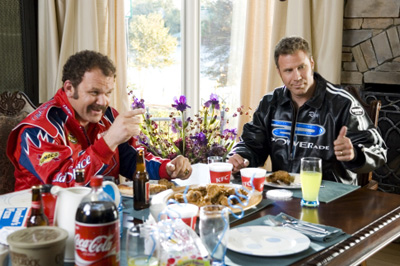 Q: Is Cal a hybrid? Is there anyone specific you based him on?
Q: Is Cal a hybrid? Is there anyone specific you based him on?
Reilly: No, no one specific. I mean, Richard Petty would be the most obvious one, because he wears sunglasses all the time and he has a mustache, but you look at the guys – the only reason that he’s so famous for looking that way is because he stayed looking that way. You go back to his era when he started out, there was a lot of guys that looked like that, you know.
Q: Is it true you’ll be doing another film with Will?
Reilly: I hope so. Yeah, we’ve got an idea and we’re working on it, yeah, Will’s a busy guy, but I would love to. As soon as we started realizing like ‘Wow, Will and I get along great on camera,’ like we already knew we were friends and we really liked each other, and we saw how easily we got things going on film, and how much I loved working with Adam, almost immediately – what are we gonna do next? That was what we did for sport on the set, was think of ridiculous movie ideas.
Q: Are you going to be in the new Paul Thomas Anderson film?
Reilly: No, he’s already halfway through finishing it, shooting it. Yeah.
Q: And you’re not in it?
Reilly: Nope. He’s got Daniel Day Lewis. Who else does he need? I don’t know, maybe some other day, but not on this one.
Q: You talked about playing the best friend a lot. Do you ever worry about typecasting?
Reilly: Well, yeah. I’ve been operating in kind of in a way to like avoid it, yeah, so I guess I am concerned about it, but I’m pretty slippery, you know. Every time they think they’ve got me figured out, I come out and do something different. That’s the game, you know, that’s the game as an actor – unless you’re just kind of playing your own personality, I like that too. I like when people know exactly, have a good sense of themselves, and know exactly what’s good for them, I admire that, but I don’t have anywhere near that kind of perspective on my own… I don’t know who I am, to tell you the truth.
Q: In the Paul Thomas Anderson films, there’s a certain cache there, and then it’s thrown off when you do Chicago or this film. It seems like a conscious thing.
Reilly: Yeah. It’s more like just trying to stay interested in your work, something that you haven’t done before. I’m bored by repeating myself, and I would imagine that an audience would be bored by me repeating myself.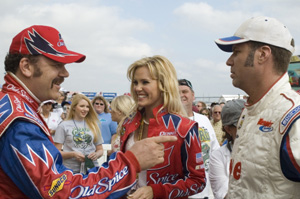 Q: Can you talk about Year Of The Dog?
Q: Can you talk about Year Of The Dog?
Reilly: I just shot a week on it, and they’re still filming. It’s gonna be good.
Q: What’s the story about?
Reilly: Molly Shannon plays a girl who, depending on your point of view, either descends into madness or ascends into sanity, and it involves animal rights and pets and all that kind of stuff.
Q: Is it as dark as Chuck And Buck?
Reilly: Uh, it’s as weird as Chuck and Buck, I don’t think Mike [White] can do things that are not weird [laughs]. There’s always something slightly subversive about his writing.